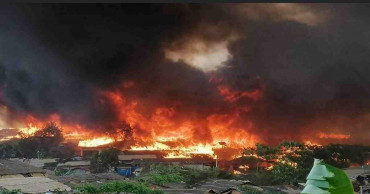Rohingya Refugee
UNHCR ‘not involved’ in discussions on Bangladesh-Myanmar pilot project on Rohingya repatriation
UNHCR, the UN refugee agency, has said conditions in Myanmar’s Rakhine State are currently “not conducive” to the sustainable return of Rohingya refugees.
“UNHCR’s position on returns of Rohingya refugees to Myanmar remains unchanged,” said the UN agency sharing its assessment.
The UN agency said it is aware of the visit of a Myanmar delegation to Bangladesh to meet with a group of Rohingya refugees — on a bilateral pilot project between the two countries on possible repatriation.
“UNHCR is not involved in these discussions,” it said in a statement on Bangladesh, Myanmar pilot project on Rohingya returns. The statement was shared by the UNHCR Regional Bureau for Asia and the Pacific on Sunday (March 19, 2023) night.
Read More: OIC members must share responsibility for sustainable solution to Rohingya crisis: Momen
At the same time, the UNHCR reiterated that every refugee has a right to return to their home country based on an informed choice, but that no refugee should be forced to do so.
Bangladesh has consistently reaffirmed its commitment to voluntary and sustainable repatriation since the onset of the crisis, it said.
In support of efforts to preserve the right to return, UNHCR considers consultation of and dialogue with Rohingya refugees in Bangladesh by all parties in relation to the conditions in Myanmar’s Rakhine State as important to enable refugees to make an informed choice about return and build confidence amongst the community.
“This is particularly important as many refugees have reiterated that they do hope to go home to Myanmar as soon as conditions allow,” UNHCR said.
Read More: FM calls on global community to raise their voices to ensure safe return of Rohingyas
Following the events of August 2017, UNHCR has also consistently encouraged Myanmar to expeditiously verify the previous residence in Myanmar of refugees in Bangladesh, as part of efforts to lift any administrative obstacles to return when the refugees decide to do so.
“UNHCR therefore supports efforts that could lead to the verification of all refugees and pave the way for eventual return. This most recently included providing logistical support to members of the Myanmar delegation to cross into Bangladesh for the technical verification process,” said the UN agency.
UNHCR said it will continue to work with Bangladesh and Myanmar to ensure that Rohingya refugees maintain the right to return when they choose to do so, based on a fully informed and voluntary decision.
UNHCR will also support efforts to create conditions that would be conducive to the sustainable return of Rohingya refugees in Myanmar’s Rakhine State.
Read More: US announces $26m more in assistance for Rohingyas, host communities
In Bangladesh, UNHCR will continue to support building the skills and capacities of the refugees to facilitate their eventual return and sustainable reintegration in Myanmar.
The 2023 Joint Response Plan for the Rohingya Humanitarian Crisis in Bangladesh was recently launched and UNHCR calls upon the international community’s continued robust support for this appeal which is currently 10 percent funded.
2 years ago
Urgently rescue boat carrying upto 200 Rohingyas: ASEAN parliamentarians urge member states, others
Parliamentarians from Southeast Asia have urged ASEAN member states and other countries in the region to urgently rescue a boat carrying up to 200 Rohingya refugees, including women and children, which has reportedly been adrift off the coasts of Thailand, Malaysia, Indonesia and India for weeks.
According to the United Nations High Commissioner for Refugees (UNHCR), the boat has been adrift in high seas since late November, and dozens on board have already died during the journey, while survivors have no access to food, drinking water or medication.
“We urgently call on ASEAN member states and other countries in the region to fulfill their humanitarian obligations and launch search and rescue operations for the boat if it enters their waters, and to allow for the proper disembarkation of the refugees. It is disgraceful that a boat filled with men, women, and children in grave danger has been allowed to remain adrift. Neglecting the people on the boat is nothing short of an affront to humanity,” said Eva Sundari, Board Member of ASEAN Parliamentarians for Human Rights (APHR), and former member of the Indonesian House of Representatives.
According to media reports and information from human rights organizations, two other boats carrying Rohingya refugees have been adrift in the past weeks.
One, carrying 154 refugees, was rescued by a Vietnamese oil service vessel on December 8. They were handed over to the Myanmar navy.
Read More: https://unb.com.bd/category/Bangladesh/very-limited-spaces-offered-for-rohingya-resettlement-unhcr/106307
Another, carrying 104 refugees, was rescued by the Sri Lanka navy on December 18 and disembarked at Kankesanturai Harbor.
The Rohingyas have been suffering persecution in their country of origin, Myanmar, for decades.
The overwhelming majority of them were rendered stateless in the early 1990s by the authorities, and have suffered the most serious human rights violations since at least the late seventies.
In 2016 and 2017 they were the target of brutal military operations, displacing over 730,000 to neighbouring Bangladesh and for which the Myanmar army has been accused of genocide.
In these desperate conditions, many of them put themselves at the hands of unscrupulous human smugglers to seek a better life in countries like Malaysia, in extremely dangerous journeys through the Andaman Sea.
“In all likelihood, the delay in rescuing these boats has already caused untold suffering and loss of life. Any further delay is unconscionable. This neglect of Rohingya refugees stranded in the sea is nothing new, as it has been going on for years, and has resulted in hundreds, if not thousands, of deaths that could have been easily been prevented if the countries in the region fulfilled the most elementary humanitarian principles,” said Charles Santiago, Chairperson of APHR, and former member of Parliament from Malaysia.
Read More: 16 Rohingya including children and women detained in Sreemangal
APHR urged ASEAN to devise a comprehensive and coordinated regional response to the issue of refugees stranded at sea, in order to act effectively, and according to humanitarian principles, in such situations, as saving lives at sea must be a collective effort.
But ASEAN should also address the root causes of the tragedy that befell the Rohingya for so many years, including putting pressure on the Myanmar authorities to restore their citizenship, and receiving the refugees currently living in camps in Bangladesh, APHR said on Tuesday.
ASEAN should also help to hold the perpetrators of atrocities against the Rohingya people accountable, especially now that the army that launched the genocidal military operations against them in 2016 and 2017 has thrown Myanmar into chaos since staging an illegal coup d’état on February 1, 2021.
“ASEAN and the international community at large have stood idly for too long as the Rohingya tragedy unfolded over the years. Those countries who claim to defend human rights have a moral obligation to address the root causes of the human rights crisis afflicting the Rohingya, or these humanitarian tragedies will only repeat again and again. ASEAN member states, as well as their partners in the region and beyond, must ensure that Myanmar restore the rights of the Rohingya people, end all discriminatory practices and holds those responsible for crimes against humanity to account,” said Kasit Piromya, APHR Board Member and former Thai Minister of Foreign Affairs.
3 years ago
UNHCR seeks more support from international community for Rohingyas
UNHCR has appealed for further investment from the international community to ensure Rohingya refugees can benefit from skills development, including vocational training and other forms of capacity-building for adolescent and adult refugees.
This will allow refugees to support their communities and live with dignity in Bangladesh, and above all to prepare them for rebuilding their lives when they can voluntarily and safely return to Myanmar, said the UN agency on Tuesday.
The support from the international community has been and is crucial in delivering lifesaving protection and assistance services for Rohingya refugees but funding is well short of needs, UNHCR said.
Read: Nearly 1 mn still await life at world's largest displacement camp
The 2022 response plan seeks over US$881 million for more than 1.4 million people, including Rohingya refugees and more than half a million most affected host communities, and is so far funded at only 49 per cent, with US$426.2 million received.
Together, UNHCR said, the international community must do more to ensure that the Rohingya do not continue to languish in displacement and redouble efforts for increased political dialogue and diplomatic engagement to create conditions for voluntary, safe, dignified and sustainable return.
3 years ago
Rohingya refugee shot dead at Ukhiya Camp
A 26-year-old Rohingya refugee was allegedly shot dead at Balukhali Camp in Ukhiya upazila of Cox’s Bazaar by some miscreants for working as a volunteer for a private organisation.
The deceased was identified as Nurul Amin, who used to work as a volunteer in the camp for a private organisation, said Mohammad Ali, OC of Ukhiya police station.
Read: Newly married woman found hanging in Thakurgaon
The alleged crime occurred on Monday night in the Modhurchara area of Camp-4, he said.
“A group of Rohingyas was angry with him as he had been working as a volunteer for a private organisation. We suspect they shot him dead and fled,” said the OC.
3 years ago
Dhaka urges Jakarta to do more for repatriation of Rohingya refugees
Bangladesh has sought a proactive support of Indonesia and of the ASEAN for an early repatriation of the stranded Myanmar nationals from Bangladesh to Myanmar.
Bangladesh and Indonesia held bilateral meeting in Jakarta on Monday and discussed the issue.
Foreign Minister AK Abdul Momen and Minister of Foreign Affairs of Indonesia Retno Marsudi led the respective delegation in the discussions.
The meeting reviewed the whole gamut of the existing excellent bilateral relations and both sides renewed their commitment for further strengthening it.
The two foreign ministers exchanged felicitations on the occasion of the 50th anniversary of the diplomatic relations between the two countries.
The two countries agreed to accelerate cooperation in the areas of trade, investment, agriculture, food, energy, health and pharmaceuticals, connectivity, ICT, tourism, halal trade, human resources development, defence, youth and cultural exchanges, etc.
They expressed optimism that the MoUs in the pipeline would be concluded soon.
Read: Rohingya Repatriation: Dhaka seeks proactive role from Indonesia, ASEAN
3 years ago
Involve locals in Rohingya management: Speakers
A network of 50 local and national NGOs has demanded effective participation of local government bodies, especially the Union Parishads of Cox's Bazar in dealing with the Rohingya refugees living in the district.
The call came on Thursday at a virtual seminar organised by the Cox’s Bazar CSO NGO Forum on the occasion of World Humanitarian Day.
Speakers at the seminar said that involvement of local organizations and people's representatives is essential in formulating programmes to help the Rohingyas.
Also read: 1st phase of vaccination drive for Rohingyas ends in Cox's Bazar
Rezaul Karim Chowdhury, Co-Chair and Executive Director of COAST Foundation, and Abu Murshed Chowdhury, Co-Chair and Executive Director of PHALS moderated the seminar titled ‘World Humanitarian Day: Localization and Local Government.’
Local government expert Dr. Tofail Ahmed, Hnila Union Parishad Chairman Rashed Mahmud Ali, Palangkhali Union Parishad Panel Chairman Nurul Absar, Hnila Union Parishad Member Morzina Akter, Rajapalang Union Parishad Member Helal Uddin, Executive Director of YPSA Md. Arifur Rahman, Chief Executive Officer of Jago Nari Sangstha Sheuli Sharma also spoke at the meeting.
The keynote presentation of the seminar was presented by Md.Mujibul Haque Munir of COAST Foundation.
Mujibul mentioned that when the Rohingyas took shelter in Cox's Bazar, the local people's representatives, especially the local union council chairmen and members, stood by them along with the local people. Being closest to the people, they understand the needs of the people best. Therefore, the participation of local government and local people's representatives is essential in all areas of Rohingya crisis management.
Also read: Rohingya children must be educated in their own language: FM
Dr. Tofail said that Union Parishads can play a direct and strong role in any disaster or humanitarian crisis, but we still have some structural weaknesses in the Union Parishads. Some changes in the national policy framework are needed to overcome this weakness. With the help of policy, the local body can play an effective and sustainable role in any disaster.
Hnila Union Parishad member Morzina Akhter said local representatives can play an active role in management of the refugees.
Palangkhali Union Parishad panel chairman Nurul Absar said, a Joint Need Assessment to be conducted with the participation of local people's representatives before taking any action.
Rashed Mahmud Ali, chairman of Hnila Union Parishad, said that, Rohingya management can only be appropriate and effective if everyone works together.
Rezaul Karim Chowdhury said, effective localization of humanitarian and development assistance to Rohingya management must be ensured.
4 years ago
Bangladesh against any idea leading to Rohingya integration: FM
The government has taken a very strong stance against the idea floated by the World Bank that apparently suggests the integration of Rohingyas into Bangladesh as Bangladesh’s priority remains repatriation of Rohingyas to their homeland.
“We took a very strong stance. We didn’t like it and we opposed it strongly. We conveyed it,” Foreign Minister Dr AK Abdul Momen told UNB.
The World Bank came up with a programme as part of its Refugee Policy Review Framework globally for refugee host countries through the Economic Relations Division (ERD).
“Rohingyas are not refugees here. They’re taking shelter temporarily,” Dr Momen said, adding that Bangladesh wants the repatriation of Rohingyas to their place of origin in Myanmar.
Asked about the WB’s proposed programme, the Foreign Minister said the WB is saying effective steps to be taken to identify, prevent and mitigate social tensions and risk of violence among the displaced people and host communities, building good relations among themselves, and to employ them in local works.
Read: Poor host communities fume as Rohingyas start grabbing local labour market
He said they (WB) are saying Rohingyas should have the right to work and free mobility; and birth, marriage, divorce and death certificates should be issued for the Rohingyas like Bangladesh citizens. “Naturally, we don’t accept those ideas. They (WB) are willing to give money for these if we do integrate them.”
As per the WB ideas shared with the ERD, the Rohingyas should have access to local labour market, including business opportunities, the same way Bangladesh nationals have with the same payment facilities.
4 years ago
Myanmar refugee crisis brewing as turmoil hits economy
Aid workers and activists are warning Myanmar’s political upheavals risk causing a regional refugee crisis as the strife following a February coup displaces growing numbers of people who have lost their livelihoods.
Tom Andrews, the U.N. special rapporteur for Myanmar, said violence has left nearly 250,000 people displaced. As Myanmar’s neighbors prepare for a summit this week to discuss the coup, he and other rights advocates are warning that the situation could spiral out of control.
Also Read: Fleeing coup, Myanmar refugees in India seek asylum
“The world must act immediately to address this humanitarian catastrophe,” Andrews said in a Twitter post on Wednesday.
A mass civil disobedience movement and efforts by security forces to crush it have left many out of work. Disruptions of internet service by authorities are also wrecking the means many in the impoverished country rely on to make a living.
The 10-member Association of Southeast Asian Nations, or ASEAN, called a meeting Saturday on the crisis that has left more than 700 civilians dead, according to the Assistance Association for Political Prisoners, which tracks the casualties since the military takeover.
Also Read: Rohingya refugees fear returning to Myanmar after coup
ASEAN’s stance of non-interference in each others’ internal matters, and the relatively undemocratic nature of many of the members own governments, has left Myanmar’s neighbors wary of imposing any sanctions against the regime that seized power from the elected civilian government of Aung San Suu Kyi. She has been imprisoned along with more than 3,000 others.
The growing number of people fleeing bombings and other violence by Myanmar forces “is something they (ASEAN) want to remain in control of. Refugees spilling over the borders are not internal, it becomes a regional issue,” said Sally Thompson, executive director of The Border Consortium, the main provider of food, shelter and other support to refugees from Myanmar for more than three decades.
“It is the ASEAN countries that can put pressure on Myanmar because they are a trading bloc,” Thompson said in a briefing at the Foreign Correspondents Club of Thailand.
She estimated that about 7,000 people were camped along the Salween River on the border with Thailand, with more than 1,000 hiding in Thai forests. That is only one area along borders that stretch from India to the west to China and Thailand to the north and east.
So far, most of those displaced are still within Myanmar, adding to those already having to flee due to long-running ethnic insurgencies. But fighting has disrupted their access to food and other necessities.
“People have been finding areas of solace inside Myanmar still, but if this conflict broadens into the ethnic states along the border areas, you will see refugee flows,” James Rodehaver, Bangkok-based chief of the Myanmar team of the Office of the High Commissioner for Human Rights, said at a recent seminar.
The mass civil disobedience movement has left many Myanmar businesses, from banks to hospitals to garment factories, shuttered. That has prompted people to flee from cities back to their home villages, burdening families that had relied on them for support.
The troubles are amplified by the coronavirus pandemic, which raises risks of spreading outbreaks and also forced some migrant workers back to Myanmar from Thailand and other countries.
“The economy in Myanmar is collapsing. Salaries are no longer being paid. People’s livelihoods are disappearing as they are in hiding for their own safety,” Thompson said. “The entire country is headed for a humanitarian crisis.”
So far, most of the sanctions taken to try to compel Myanmar’s military leaders to reverse the coup and restore the elected government have been adopted by Western governments.
That includes banning business with major military-affiliated companies that dominate many industries, including the lucrative gems and jade trade.
It’s unclear whether such moves have had much impact, just weeks after the coup. It takes time for flows of revenues to taper off, and so far companies paying revenues for oil and gas, the country’s biggest export, are mostly staying put saying they hold a responsibility to keep the energy-scarce country’s lights on and to protect their own employees. But it is clear that the economy is headed for worse trouble, economists say.
Fitch Solutions downgraded its estimate for 2% growth in the current fiscal year, which ends in September, to a contraction of minus 20%.
ASEAN accounts for about a third of all of Myanmar’s foreign trade, with China having a larger share. And much of the foreign investment in the country comes from within the region.
4 years ago
S Korea provides US$ 1 mn to IOM to support Rohingyas affected in recent fire
The government of South Korea has decided to provide emergency support of US$ 1 million to the International Organization of Migration (IOM) in order to support the humanitarian activities in response to the massive fire that broke out recently at the Rohingya camps in Cox’s Bazar.
According to international agencies, the fire that broke out on March 22 heavily damaged Camp 9, Camp 8E, and Camp 8W located in Kutupalong Balukhali area, Cox’s Bazar, with approximately 10,100 households destroyed and about 48,000 Rohingya refugees displaced.
Also read: $ 20mn required to respond to urgent needs after Rohingya camps fire: IOM
The Korean Government’s support will help international humanitarian agencies’ response and recovery activities benefit the most affected and rebuild the destroyed refugee shelters and living facilities, including LPG distribution, latrines, and bathing systems.
Since the outbreak of the Rohingya refugee crisis in 2017, the Republic of Korea has been providing annually four to five million US dollars for activities of international humanitarian agencies such as UNHCR, UNICEF, IOM, WFP, and IFRC for responding to the large scale international humanitarian crisis and supporting for Bangladesh host community.
Also read: Fire at Rohingya camp caused 'enormous devastation': UNICEF
The Embassy of the Republic of Korea said they will continue to make its best effort to address the humanitarian crisis and the ultimate repatriation of Rohingya refugees in close cooperation with the Bangladesh Government and the international community.
4 years ago
UN agencies ramp up response for Rohingya refugees after ‘unprecedented’ fire
United Nations agencies have stepped up their efforts to assist thousands of Rohingya refugee families left homeless after last week’s devastating fire at Kutupalong refugee camp in Cox’s Bazar.
The fire destroyed about 9,500 shelters and also reduced to ashes over 1,600 vital facilities, including hospitals, schools, and food and aid distribution centres.
As of Tuesday, at least 11 people are confirmed to have perished in the fire and over 300 are still missing, reports the UN News.
Richard Ragan, UN World Food Programme (WFP) Country Director in Bangladesh, said the scale of the fire was “unprecedented” and that the agency is “determined” to help those affected get their lives back to normal as quickly as possible.
“WFP, together with our partners and thousands of volunteers, have supported the families since the start of the tragedy, in meeting their most urgent needs of food and water. Where two of our nutrition centres once stood, debris were cleared in record time, stocks were replenished, and services resumed for children and their mothers,” he said.
Also read:Rohingya camp fire: Death toll climbs to 11
According to WFP, its top priority now is providing food to affected families, until they can have access to shelters and cooking stoves. It aims to reopen electronic voucher outlets to allow families to purchase staple and fish foods.
The agency has also erected temporary structures, from which it is providing breastfeeding support and counselling to mothers, and additional food to children under five. “We’re determined to do what we can to help them get their lives back to normal as quickly as possible,” Ragan added.
Psychosocial support
The UN International Organization for Migration (IOM) and the UN refugee agency (UNHCR) have also upped their response, deploying mental health and psychosocial support teams to help refugees who lost everything in the fire. So far, over 5,000 people have been provided with emotional and psychosocial support, and more than 700 with psychological first aid.
Also read:UN releases US$14mn for Rohingyas left homeless by camp fire
IOM also engaged over 11,500 cash-for-work laborers to help clear debris and support reconstruction.
UNHCR teams on the ground are monitoring the safety and security of refugees, and working to address the needs of separated children, spokesperson Andrej Mahecic said.
“Since the fire, together with our partners, we’ve identified more than 600 separated girls and boys who have been reunited with their families. Our protection partners also established two child protection helplines and four reunification help desks,” he added.
Also read:Maldives sends message of sympathy over Rohingya camp fire
Refugee volunteers supporting response
Refugee volunteers are also supporting affected families, according to the UNHCR spokesperson. They were among the first responders to help combat the fire and since then have been helping older refugees, children and pregnant women find shelters, escorting people to health care facilities, and identifying and referring refugees with specific needs to relevant services.
“They’re also running awareness sessions on child protection risks such as child-trafficking and gender-based violence, fire safety, first aid and general assistance,” Mahecic added.
The UNHCR spokesperson also called for additional resources to address the immediate aftermath of the catastrophic fire. “[We are] asking government and private sector donors to keep their contributions flexible, thus allowing their use across the overall operation.”
4 years ago





.jpg)


.jpg)




